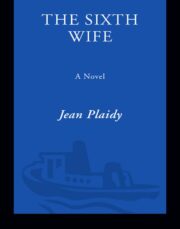“Come,” it seemed to say. “It is what you need. It is what you wish for yourself. It is what he wishes for you.”
And she felt that she was drifting forward into that peace.
ON A SUNNY SEPTEMBER day the gentlemen and esquires of the Queen’s household carried the leaden chest, in which lay Katharine Parr, into the little chapel attached to the Castle of Sudley.
The walls of the chapel were hung with black cloth, and on them, to remind the assembly that this lady had been a Queen, were not only the arms of the Seymours, but also those of King Henry the Eighth whose sixth wife she had been.
After the birth of her daughter she had died, having, some said, no wish to live. Others went further and said that she had been hastened to her death.
Lady Jane Grey, one of the Queen’s chief mourners, listened to the service conducted by the Queen’s cofferer and recalled what she knew of the life of this lady whom she had loved; she remembered those alarming days when she had been the King’s wife, and the strange good chance which had led Nan to the courtyard when Wriothesley had dropped the all-important paper; and it seemed to Jane that God preserved some men and women from disaster whilst He guided the footsteps of others toward it, so that it seemed that each had a destiny to fulfill here on Earth.
What of herself? she wondered fleetingly; and in the stifling atmosphere of the chapel she shivered. Her father was ambitious, and there were plans being made to encircle her head with a crown. How could she, a young girl, know what fate awaited her?
Dear Queen Katharine! she thought. I shall never see her again. Never hear her gentle voice…never see her sweet smile…
Now they were carrying the coffin out of the chapel. Soon they would bury it, and it would be goodbye… goodbye for ever to Queen Katharine Parr.
THE RUMORS WERE spreading all over the land. How did Katharine Parr meet her death? There were unpleasant stories which came from those intimate with the Queen’s household and who knew of her husband’s light behavior toward a royal Princess who had lived under his roof.
Why did the Queen die?
The Princess Elizabeth would be an excellent match for the ambitious Admiral.
The stories grew in wildness. Some said that a midwife had told a tale of being led blindfold to a quiet house that she might deliver a baby. She knew the mother must be a person of high degree, though she could not say more of who she was, except that she was young, fair and imperious. She might well have been a Princess.
The Duchess of Somerset listened to these stories. They amused her; more, they delighted her. But the story she liked best was that which insisted that the Lord High Admiral had decided to rid himself of his wife by poison, and that this was the explanation of her sudden death.
For, as she said to her husband, although the King would be loath to sign the death warrant of his beloved uncle whom he idealized, if he could be convinced that his idol had poisoned the beloved stepmother, he might be more ready to put pen to that necessary document.
It was easy to spread such rumors. They ran through the capital, through the provinces, through the countryside, like fire that is unchecked.
Katharine Parr, the sixth wife of Henry the Eighth, is dead. She married a fourth husband. Was that wise? The Admiral was such an ambitious man. And what part had the Princess Elizabeth played in this affair?
So men and women stopped to talk in the streets of this matter.
“Queen Katharine Parr is dead. Her husband killed her…for the sake of the Princess Elizabeth. He waited until the child was born… then he poisoned her.”
He poisoned her! That became the simple cry which emanated from all the rumors.
The words held a menace, and the shadow of the ax deepened over the heads of those who had lived close to the King’s sixth wife.
THE END
About the Book


"The Sixth Wife: The Story of Katherine Parr" отзывы
Отзывы читателей о книге "The Sixth Wife: The Story of Katherine Parr". Читайте комментарии и мнения людей о произведении.
Понравилась книга? Поделитесь впечатлениями - оставьте Ваш отзыв и расскажите о книге "The Sixth Wife: The Story of Katherine Parr" друзьям в соцсетях.